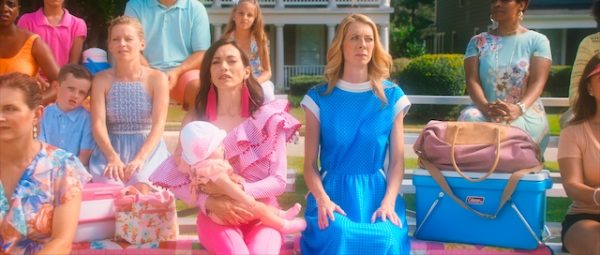Are you familiar with the ways of the people from the Midwest? Where everyone is super polite, politically correct, and sports a perma-smile (maintained by braces) just to keep up appearances? Actresses, screenwriters, and directors Jocelyn DeBoer and Dawn Luebbe explore this notion in their Independent Spirit nominated Best First Screenplay, Greener Grass. The title conjures up wholesome images of bucolic suburban houses with perfectly manicured lawns that match their letterboxes. But DeBoer and Luebbe are visual artists, so the film is saturated with lurid, vibrant colors resplendent of artists like Dali, absurd dialog and situations, muted exaggeration, and outright kookiness. The screenwriting duo spoke to Creative Screenwriting Magazine about the birth of their film.

Jocelyn DeBoer
“Dawn and I grew up in the Midwestern suburbs as children of the nineties. We came from a world of extreme politeness and made sure to please those around us, without thinking what we really want,” recalled Luebbe. After college, they moved to New York where they experienced the culture shock of extreme directness first hand. Not rudeness, but people said exactly what was on their mind. “People were more curt so we wanted to explore the differences between the two cultures.”
During their time in New York, DeBoer and Luebbe put together a sketch comedy team, where the origins of Greener Grass were formed. The pair eventually made the move to Los Angeles in 2015 where they fleshed out their idea into a web series. “This is when we decided to explore themes of politeness taken to the extreme which eventually became Greener Grass the short film,” added Luebbe.
Jocelyn DeBoer expanded on the concept of extreme politeness. “We explored what happens when you make choices based on what you think other people think of you. This sharply contrasts with L.A. and New York where people put themselves first.” The short film piqued the interest of Lionsgate who invited DeBoer and Luebbe to pitch a television version of Greener Grass. During the six-week period of writing additional material, the television series was finally canned. After a few subsequent unsuccessful TV show pitches, they looked back to Greener Grass and decided it would make a great feature film. The development work on the TV version of Greener Grass did not go to waste because Deboer and Luebbe had a deeper well of material to draw from. The adaptation process allowed them to rework the short into a more streamlined feature-length screenplay.
Seven Events
While they were developing the feature screenplay, the identified seven key events in the short. “The short was a comprised of a series of vignettes with each containing one unusual thing,” explained DeBoer. “We used each of those things that became the tentpole for the feature. We built the character and the character arc around these tentpoles.” These included acting as if nothing had happened after an extraordinary event such as a scene when the two women realized they kissed the wrong husband. Ooops! It could happen to anybody, right?
Interestingly, the TV series diversion meant they went about a year without watching the short. “When we eventually got back to it, we remembered the nugget of the original creative,” added DeBoer. This allowed for a more focused feature screenplay.

Dawn Luebbe
The filmmaking duo declined to pigeon-hole their style of comedy as dark, surreal, or deadpan, but rather, expounded on how it functioned. “We were playing with people’s expectations. We wanted to create normal feelings for abnormal events,” added DeBoer. Undoubtedly, the screenwriters turned these expectations on their head by introducing an element of surprise and satire. An example they cite is a scene where the couple is eating dinner at a restaurant and the waiter drops their food. Rather than upset the waiter in any way, the couple ate their food off the floor to keep him happy.
Jocelyn DeBoer and Dawn Luebbe draw artistic inspiration from filmmaking greats like John Waters and David Lynch. They also watched Catherine, the web series by Jenny Slate and Dean Fleischer-Camp to inspire their creativity. “Everything plays it extremely neutral even with very high stakes,” said Dawn. “We also wanted to set up a world of the extremely familiar and turning it on its head with an unfamiliar reaction,” added Jocelyn. Some scenes almost had a French farcical aspect to them you can’t help but laugh.
Writing Process
Every screenwriting collaboration has its own process. For DeBoer and Luebbe, “we work the best side by side. We write everything together. We come up with a lot of our jokes by riffing with each other. One of us will have an idea for a joke and the other one would make it better. Then the first would come up with something even better to complete it.”
During the writing process, they work intuitively and don’t over-intellectualize the jokes. There’s an innate calibration of what jokes best fit into our writing. “It’s more important to us for people to feel really connected to the characters.”
Wearing screenwriting, acting and directing hats in Greener Grass could have posed problems for some filmmakers, but not for DeBoer and Luebbe. “In some ways, it made things a little easier because we could capture our specific voice and tone of the movie exactly as we intended it,” said Luebbe. This eliminated the potential problem of carefully poring through every line in the screenplay to determine what the screenwriter meant. “We knew what we could see in the frame in this moment before we transition into the next one. We talked about how we were going to shoot it as we wrote it.“
